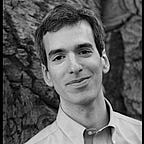Teaching Entrepreneurial Journalism: The Tow-Knight Curriculum
Here’s an overview of our five core courses, our four educational supplements, and the learning outcomes we aim to achieve.
Our entrepreneurial journalism program aims to provide a strong foundation of knowledge, experience and skill for those working toward a sustainable future for journalism. We believe journalism’s future will be shaped by those who engage with their communities, create innovative products and services, and develop new business models.
Our entrepreneurial cohort focuses on five core classes:
- Business Fundamentals for Entrepreneurial Journalists, a course I teach, focuses on the core elements of business, from finance, strategy and marketing to “softer” areas like leadership and negotiations.
- New Business Models for News, a seminar led by Tow-Knight Center Director Jeff Jarvis, focuses on the evolving global news ecosystem and the challenges and opportunities facing media innovators.
- Entrepreneurial Skills is a hands-on course all about developing a toolkit for building a venture. This year the course is led by Revsquare founder Jeff Mignon, a veteran media entrepreneur and CEO. The emphasis is on running real-world experiments and making iterative, evidence-based decisions about how to create something useful for people that will satisfy a need or solve a problem.
- Media Innovation Fieldwork offers an opportunity for us to visit a hub of media innovation each week. Our network of generous hosts— including people like Celeste LeCompte at ProPublica, Dan Oshinsky at the New Yorker, and Yusuke Umeda at Quartz — give us an inside look at the opportunities and challenges they’re addressing. In addition to visiting journalism organizations, we’ve in the past visited firms like Facebook, IDEO and McKinsey to explore their impact on—and ideas about—the journalism ecosystem.
- New Business Incubation is where each participant works on her or his venture in one-on-one meetings with coaches, mentors, peers, professors, industry experts and others. Some people come in with an existing venture, while others start with an identified problem or opportunity.
By the end of the term, everyone has developed and refined their venture through an iterative product development process. They’ve also explored various approaches to building a community and taken steps to develop new revenue streams. Fellows present their projects in multiple settings, including public pitch sessions and one-on-one meetings.
RESOURCES: We have a short list of learning outcomes we aim for in our courses, and these sample course syllabi provide an overview of what we teach. If you’re interested, here’s a toolkit I’ve curated for teaching or learning entrepreneurial journalism. And here’s a recent post about this year’s cohort:
We also offer four supplemental learning opportunities to stretch students’ skills and knowledge in new directions.
- The extraordinary John Keefe leads a Prototyping Lab. He has students creating bots one week, Alexa skills another; on another occasion they may explore the value of journalism sensors by building one. Each session offers a hands-on opportunity to explore the frontiers of journalism tech. Follow along with John’s syllabus and step-by-step notes here.
- Tech, Media and Democracy is an interdisciplinary course — a collaboration between CUNY, Cornell Tech, NYU, Columbia, and The New School. It’s led in part by Justin Hendrix, Mor Naaman, Emily Bell, Mark Hansen, David Carroll, Michael Young, myself and others. The course invites students to wrestle with vexing contemporary issues at the intersection of technology and media that impact our society. Students also meet potential partners — fellow students in programs focused on journalism, business, computer science, design, and other related areas.
- In addition to courses, we host weekly guest speakers, including entrepreneurs, industry leaders, investors, and domain experts. This group includes media innovators like Rafat Ali of Skift, Veken Gueyikian of hyperallergic, angel investor Alicia Syrett, Jan Schaffer of J-Lab, Sarah Adler of Spoon University, Steve Katz of Mother Jones, and many others. Our visitor list also features program alums like Andaiye R. Taylor, Ranjan Roy, Michael Rain, Christian Fahrenbach, Hong Qu, Noah Rosenberg.
- This year we’re expanding our supplementary offerings on improvisation, public speaking and storytelling. Philip Markle, the artistic director of the Brooklyn Comedy Collective, is leading a three-part workshop series that encourages students to present their authentic selves. The fellows are presenting their projects at monthly review sessions for ongoing feedback and to practice speaking. And we’re continually looking for new opportunities and creative approaches to help students strengthen their public speaking and storytelling skills.
